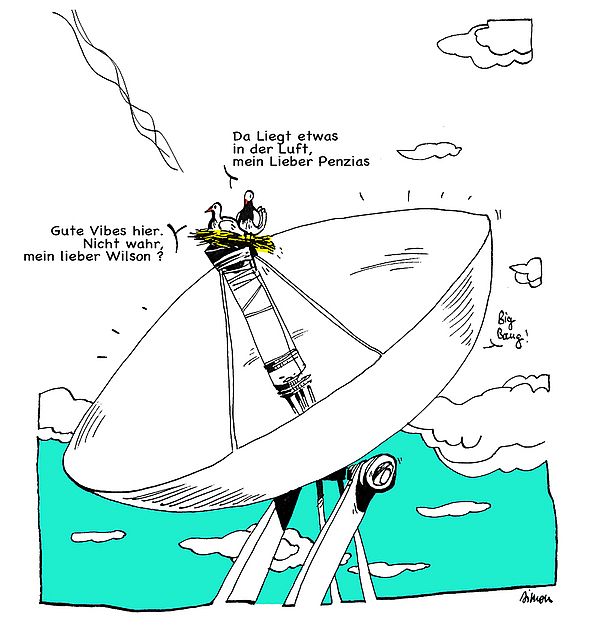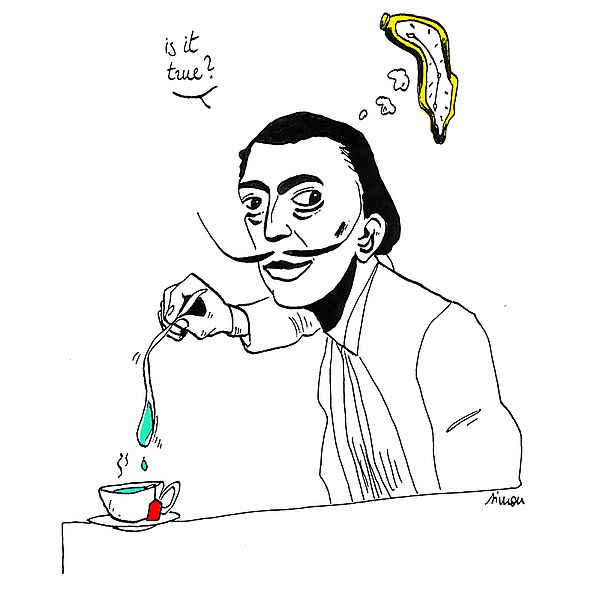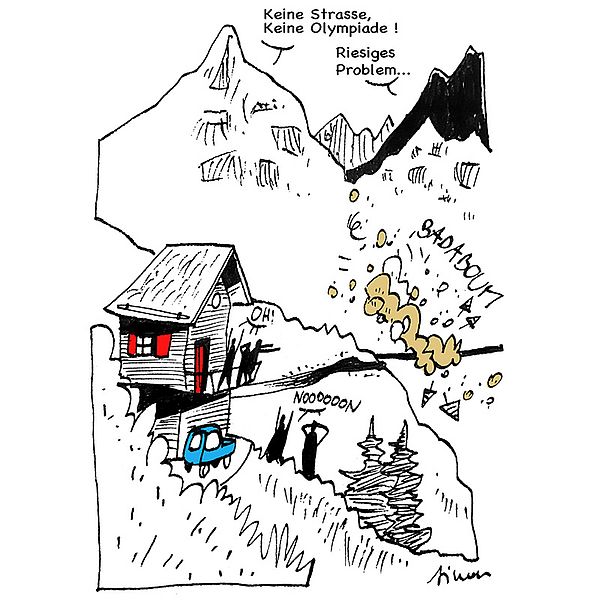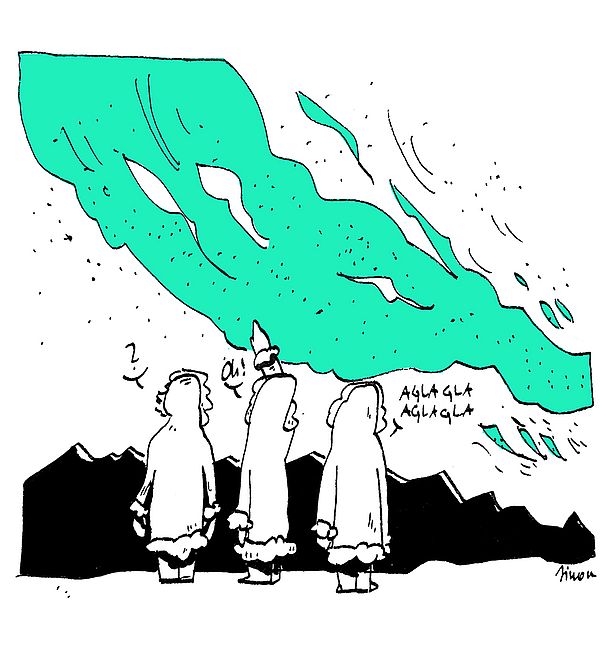«Shit happens»
also in science
Honestly, there are days when everything goes wrong. Researchers also know days like this – and so do we at the Science Olympiad. We tell you eleven stories with mishaps and errors. Are they true or fictional?
1. Pigeons and telescopes
In the mid-20th century, physicists Penzias and Wilson built a radio telescope that allowed them to measure weak signals from satellites. The measured background radiation was 100 times stronger than expected. As it turned out, pigeons nested on the telescope and falsified the measurement.

Unfortunately not guessed corretly! The story is not true. The measured background radiation was still equally strong even after the removal of the pigeon nests. In truth, Penzias and Wilson had observed cosmic background radiation, a remnant of the Big Bang. They even received the Nobel Prize in 1978 for this discovery. You can find more information here.
Exactly right! The second part of the story is made up. The measured background radiation was still the same even after the removal of the pigeon nests. In truth, Penzias and Wilson had observed cosmic background radiation, a remnant of the Big Bang. They even received the Nobel Prize in 1978 for this discovery. You can find more information here.
2. Rotten sandwiches lie in the sun
Colombia, Summer, Math Olympiad. The grand opening ceremony is coming up. It starts with a long bus ride, from Santa Marta to Barranquilla, in two hours. The mayor is on fire, talks and talks, the celebration lasts an unbelievable three hours. The sandwiches are left in the Colombian sun for just as long. In the evening, several participants are lying flat and sick in bed. Not exactly the best preparation for the exam day!
3. A momentous essay
Since ancient times, philosophers have believed that "knowledge" can be defined simply as "justified true belief". Edmund Gettier threw this millennia-old definition overboard in 1963 with a three-page essay.
4. Would you like a little more metal?
Let's say you're studying at home for a chemistry test. You need a break and make yourself some tea. You are amazed at the first sip: the metal spoon in your cup has melted and the beverage is undrinkable.

Exactly right! The story is quite conceivable. The metal gallium has an unusually low melting point of about 30°C. A spoon made of pure gallium would melt in your cup of tea.
Unfortunately no! The story is quite conceivable. The metal gallium has an unusually low melting point of approx. 30°C. A spoon made of pure gallium would melt in your cup of tea.
5. The self-experiment
1984: science is adamant that bacteria cannot possibly survive in our stomachs because stomach acid kills every last bacterium. The doctors at the time explained that anyone suffering from stomach ulcers had psychological problems.
That doesn't convince the Australian Barry J. Marshall. He suspects that bacteria could be responsible for ulcers. His hypothesis is off-putting, but he doesn't let it deter him. On the contrary: he takes action and drinks a test tube full of bacteria. A short time later, an ulcer develops in his stomach that can only be treated with antibiotics. Marshall discovers the bacterium Helicobacter pylori on his own body, the bacterium responsible for many stomach ulcers.
Exactly right! The story is true, the self-experiment led to an important discovery in medicine. You can find more information here.
Unfortunately wrong! The story is actually true, the self-experiment led to an important discovery in medicine. You can find more information here.
6. Death of an essay
At a final of the Philosophy Olympiad, a participant saved his essay on the wrong drive, after which it was automatically deleted. Although we spent the afternoon trying to save the essay, it was lost forever.
That's correct! Since then, the story has been told at every final so that everyone can also save their essay correctly. If you like writing essays despite the dangers of technology, then take part in the philosophy Olympiad.
Unfortunately no! The story is true. Since then, it has been told at every final so that everyone saves their essay correctly. If you like writing essays despite the dangers of technology, then take part in the philosophy Olympiad.
7. Help, how do we get out of this?
Summer 2016, an idyllic valley in the Valais Alps, far from the nearest town. 5 young people put their heads together and train for the international physics olympiad. A single access road leads to the remote place and that almost becomes their undoing. The idyll is done when, the night before departure, there is a landslide that fills the road with boulders. Help, and so close to the big competition! No road, no Olympiad! Huge problem...

That's right! Fortunately, the buried site could be passed with a few climbing moves, so that the team still arrived on time at the International Physics Olympiad. You can find more information here.
Unfortunately wrong. The story is true. Fortunately, the buried site could be passed with a few climbing moves, so the team still made it to the International Physics Olympiad on time. You can find out more here.
8. The millennium problem of computer scientists
One of the most well-known problems in theoretical computer science revolves around the question of whether the two complexity classes `P' and `NP' are equal. If they are not equal, then there are problems that are `hard'. This means that they cannot be solved efficiently. Much of the cryptography in use today is based on this very assumption. But since this assumption has not yet been proven, nobody knows for sure whether our current methods are actually safe.
In the summer of 2017, Norbert Blum, a German computer science professor, published a proof that `P' is not equal to `NP`. But not even three weeks later he withdrew it again: the proof of one of the theorems was wrong. Accordingly, this millennium problem is still unsolved and we still cannot be sure that the encryption methods used cannot be cracked.
Exactly right! Unfortunately, the proof was indeed flawed and the problem remains unsolved.
Unfortunately, no! Would have been great, of course, if the proof had been correct, but unfortunately that is not the case. The story is correct.
9. Disenchanting the Aurora Boreali
There is something magical about the northern lights and many Nordic peoples interpreted them as symbols of the gods. It was believed that they wanted to warn the people of bad times such as war, plague or famine. In the 18th century, researchers initially suspected that the northern lights were reflections of sunlight on clouds or ice crystals. Then Edmond Halley came along and explained the formation of the northern lights scientifically for the first time. According to his theory, aurorae occur in the northern latitudes because the earth's crust is thinner there and the light from the hollow earth can shine through.

Exactly right. This story is really true. It was not until the 19th century that a connection between the appearance of the aurora borealis and the occurrence of solar winds as well as activities in the Earth's magnetic field was suspected and later proven.
Unfortunately, no. This story is actually true. It was not until the 19th century that a connection between the appearance of the aurora borealis and the occurrence of solar winds as well as activities in the Earth's magnetic field was suspected and later proven.
10. Hitno moram ići na aerodrom
Sometimes you miss flights because bus drivers and passengers just don't get along. This happened to a Swiss youth when he wanted to fly home after the Geo-Olympics in Serbia. On the bus to the airport were a driver who didn't speak English and four young people who didn't understand Serbian. The chauffeur took his job very seriously and waited for five registered people. One of the passengers - not the Swiss! − had overslept and was an hour late. The Swiss student couldn't explain to the driver that they had to leave urgently, so he missed his flight.
Unfortunately wrong! The participant was lucky because he grabbed a taxi and arrived at the airport just in time.
Exactly right! The participant was lucky because he grabbed a taxi and arrived at the airport just in time.
11. Math in a nutshell
In 1966, mathematicians L.J. Lander and T.R.Parkin one of the shortest proofs. On one line they showed that Euler's conjecture is wrong. This postulates for a number "n" greater than 2, that the sum of (n-1) nth powers can never be an nth power. In their work, the authors gave a simple counterexample in which they added four 5th powers and got a 5th power. Unfortunately, they made it a little too easy for themselves. Funnily enough, when adding the powers, both made the same calculation error.
Unfortunately guessed incorrectly. In fact, the counterexample we found is correct and the proof remains probably the shortest article ever written in mathematics. You can find more about it here.
Exactly right! In fact, the counterexample we found is correct and the proof remains probably the shortest article ever written that was ever published in mathematics. You can read more about it here.
Done!
11 stories − 11 mishaps and errors. We hope you had fun and laughed every now and then. Fancy one of the eight Olympiads? You can find all the information in the agenda. Visit us again from time to time. In News there is exciting content on the subject of knowledge, travel and friends.
Don't want to miss a thing? Then follow us on Instagram and that way you can stay in touch with us even after the IChO 2023!
Illustrations
Simon Charrière
Quiz
Editorial Team Science Olympiad: Eva Angehrn, Biology; Julia Fischer, Chemistry; Juliane Krenz, Geography; Benjamin Schmid, Computer Science; Henning Zhang, Mathematics; Lara Gafner, Philosophy; Barbara Roos, Physics; Mirjam Sager, Science Olympiad